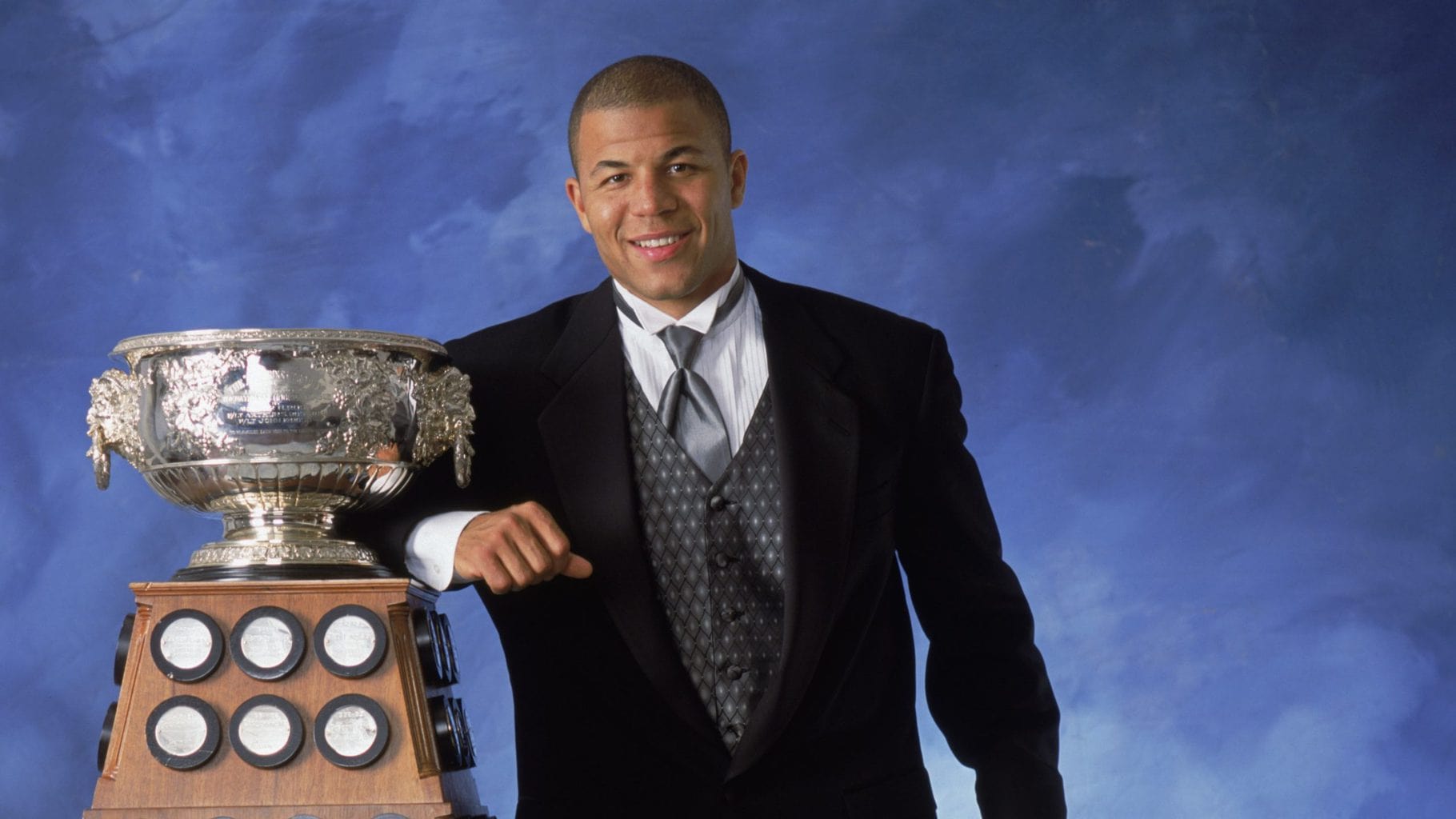
The NHL’s 2001-02 season was one of few goals, many saves, and one infamous award snub. Given that this was the “dead puck era,” it’s fitting that one skater—Jarome Iginla—and two goalies—Patrick Roy and José Théodore—were named as the finalists for the Hart Memorial Trophy. Still, Iginla was the favourite going into the 2002 NHL Awards ceremony, and for good reason too. In the regular season, he’d delivered a historic individual effort that was deserving of the award.
But on awards night, things took an unexpected turn. Wayne Gretzky took the stage to reveal the outcome: “The Hart Trophy winner is… José Théodore,” he announced, in a shocking upset.
Though it came as a surprise, Théodore’s win at first seemed like any other on an NHL Awards night. But it was made known shortly thereafter that this trophy vote was more complicated than any other in NHL history.
Théodore and Iginla had tied in votes. The Montreal Canadiens goaltender won the first-ever Hart Trophy tiebreaker, which goes to the player who receives more first-place votes.
But there’s more to the story that merits reconsideration. It involves long-standing debates surrounding what makes an “MVP.” Controversy also followed after it was discovered that a single voter left Iginla off their Hart Memorial Trophy ballot. Ultimately, Iginla was deprived of the win despite having achieved one of the NHL’s most valuable performances ever.
The 2001-02 NHL Season
Jarome Iginla’s Stats Lead Low-Scoring Season
Iginla had a serious breakout campaign in the 2001-02 season. The Calgary Flames winger had emerged as a goal-scoring power forward in five seasons prior, but in 2001-02, he soared to 52 goals and 44 assists for 96 points. Those numbers led the league in both goals and points – a rare feat. In the 16 seasons since, Alexander Ovechkin is the only player to match that accomplishment, doing so in the 2007-08 season.
Related: Art Ross Trophy | 5 Things You Didn’t Know
Iginla’s 96 points in 2001-02 were six more than Markus Naslund’s 90 and 11 more than Todd Bertuzzi’s 85, which were good for second and third place in scoring. His 52 goals were also an impressive 11 more than any other player in the league: Bill Guerin, Glen Murray, and Mats Sundin all managed 41. It was such a low scoring season, in fact, that Sundin was also the only other player to reach even 80 points on the year.
Ahead of the 2002 NHL Awards, Iginla’s stats easily won him the Maurice “Rocket” Richard Trophy. The Art Ross Trophy came with moderate competition during the season, but mainly just from the first line of the Vancouver Canucks.
Iginla also was notably the first player to lead the league in goals and points after the introduction of the Maurice “Rocket” Richard Trophy in 1998.
Patrick Roy and José Théodore Shine in Net
In goal, Roy and Théodore led the way among many netminders who enjoyed shutdown seasons. This was the dead puck era just prior to the 2004-05 NHL lockout when oversized goalie gear met the embrace of the butterfly style, yielding low scoring totals.
Average goals per game numbers had begun to decline in the late 1990s, but they fell to an over 40-year low of 5.24 in the 2001-02 season. Over half the league’s starters had a goals-against average (GAA) of 2.50 or less. 11 of them had a GAA under 2.25, even.
That season, a 36-year-old Roy posted multiple career bests with a GAA of 1.94—which led the league—a save percentage (SV%) of .925, and nine shutouts. Elsewhere, in just his second season as the Canadiens starter, a 25-year-old Théodore led the league with a SV% of .931.
The Flames, Avalanche, and Canadiens in 2001-02
The teams of the three standout players in 2001-02 had divergent outcomes by the end of the regular season. Roy’s Colorado Avalanche finished tied for third in the league with 99 points; Théodore’s Canadiens snuck into the playoffs as the eighth seed in the Eastern Conference; while Iginla’s Flames struggled to a 32-35-15 record, falling short of a playoff spot.
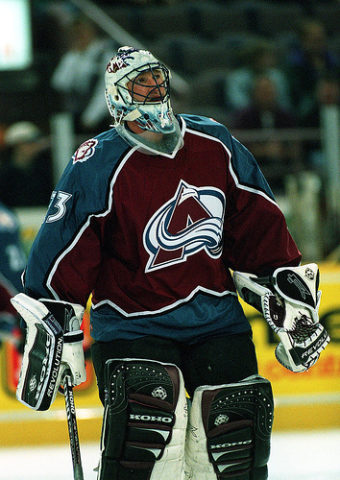
In the playoffs, Théodore led the Canadiens to a first-round upset of the top-seeded Boston Bruins. They then fell in the second round to the Carolina Hurricanes. The Avalanche were eventually eliminated by the Detroit Red Wings in a seven-game Western Conference Final series.
The Red Wings went on to defeat the Hurricanes in the Stanley Cup Final. Seven days later, the 2002 NHL Awards ceremony was held in Toronto.
The 2002 NHL Awards: Théodore Makes History
The league’s best gathered in Toronto for the 2002 NHL Awards on June 20. Though Roy was in the mix, the expectation was that either Iginla, who was the favourite, or Théodore would walk away as the Hart Trophy winner. (from ‘Théodore is MVP in stunning upset, Globe and Mail, 06/08/2002)
As it turned out, the 2002 NHL Awards were a doubly historic night. This awards year produced the first and second ties in a voting award category in NHL history. Oddly, both ties involved Théodore, as they came in the votes for the Hart Memorial and Vezina Trophies. During the ceremony itself, the ties weren’t mentioned, and Théodore was announced as the winner of both trophies.
Related: 12 Fastest Skaters Ever in the NHL
He was first called to the stage by Vladislav Tretiak and Paul Henderson. The Summit Series foes revealed Théodore as the winner of the Vezina Trophy over the other finalists, Roy and Sean Burke. Théodore and Roy had tied in votes, but the Canadiens goalie received three more first-place votes than Roy, which made him the winner of this tiebreaker.
Shortly
after, Gretzky called Théodore back to the stage as the winner of the
prestigious Hart Memorial Trophy. The Canadiens goalie once again tied with the
runner-up, though this time it was Iginla. Théodore outdid Iginla in this
tiebreaker as well.
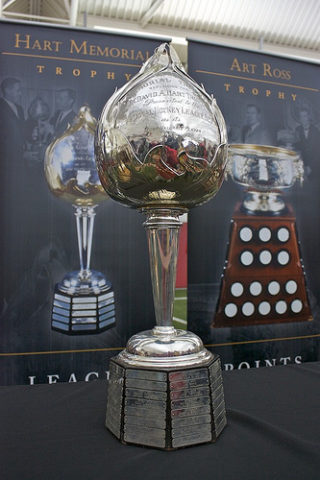
Neither Iginla nor Roy walked away emptyhanded, however. Roy and the Avalanche earned the William M. Jennings Trophy. The then 24-year-old Iginla also took the stage to accept his Art Ross and Maurice “Rocket” Richard Trophy wins. He additionally won the Lester B. Pearson Award—the MVP as voted on by the NHL’s players. Roy and Burke were the other finalists for this award.
The 2002 Hart Memorial Trophy Vote
The tie was an oddity to begin with, but Théodore’s Hart Memorial Trophy win got controversial after the voting results were publicized. The trophy is voted on by members of the Professional Hockey Writers’ Association (PHWA), each of whom selects five players on their ballot. The players are ranked and awarded votes in a 10-7-5-3-1 system for first through fifth place on each ballot.
For the 2002 NHL Awards, 62 PHWA members voted on the Hart Memorial Trophy. Iginla and Théodore both received a total of 434 points, but Théodore’s came by way of 26 first-place votes (26-16-9-5-2) while Iginla got only 23 (23-18-12-5-3). Noticeably, however, Iginla was entirely left off just a single voter’s ballot.
Since this news broke, unconfirmed rumours have suggested doggedly that a Quebec writer – who had Théodore’s MVP case in mind – was the author of the ballot without Iginla. Had Iginla made that lone ballot, even as the fifth-ranked choice, he’d have won the trophy. We do know, per Ken Campbell of The Hockey News, that at least one of Iginla’s three fifth-place votes did come from an unidentified Montreal writer, which adds a verified element of suspicion to the incident.
Today, the PHWA publishes all the ballots, which helps to avoid potential (or speculative) controversies generated by anonymous voting. But back in 2002, writers could make bold votes without having to put their names to the decisions. And to leave Iginla off the ballot entirely was a bold statement to say the least. Sure, the Flames missed the playoffs, but, frankly, it’s absurd to suggest that Iginla, who led the league in both goals and points, wasn’t one of the five most valuable players in the 2001-02 season.
Iginla’s MVP Season That Wasn’t
Iginla had a historically valuable 2001-02 season. He dressed in all 82 games and put up 52 goals and 44 assists. If fights are your thing, the winger also dropped the gloves three times. But, simply put, he accomplished these numbers on a very poor Flames team.
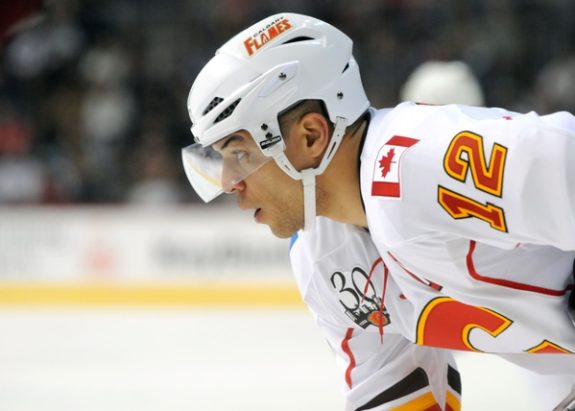
Save for Iginla, the Flames 2001-02 roster could conceivably be mistaken for that of a late 1990s-early 2000s expansion team. Centreman Craig Conroy did post 75 points alongside Iginla, while their linemate Dean McAmmond had 51. Derek Morris (34) and Marc Savard (33) were the only others to surpass the modest 30-point mark.
Related: Wayne Gretzky – The Great One’s 10 Unbreakable Records
The Flames scored 201 goals that season, meaning Iginla’s 52 accounted for a whopping 25.9 percent of them. He was also in on a total of 47.8 percent of all team goals. Subtract Iginla’s numbers—but especially his goals—from an already weak team total and you’re in historically bad territory.
Yet, despite being the lone threat on the team, Iginla managed to outscore the rest of league by a meaningful margin – in a historically low-scoring season, at that. The fact that the Flames even registered anywhere near a .500 record (32-35-15) no doubt rests squarely on Iginla’s shoulders. The young star’s performance clearly caught the attention of his peers, seeing as he won the Lester B. Pearson Award. It also worked toward Conroy, then the team captain, eventually surrendering the “C” to Iginla in the 2003 offseason.
But when it came to the Hart Memorial Trophy, some voters penalized Iginla for the shortcomings of this Flames roster, which was far from a playoff team. The trophy is a regular season award, but there’s an age-old sports debate about whether or not a team’s place in the standings should factor into the MVP conversation. This angle, among others, hurt Iginla.
José Théodore’s Hart Trophy Win
The intent of this article is not to tear down Théodore’s season. As Iginla himself said in a post-awards ceremony interview, “you really have to take your hat off to José Théodore.” The goalie had a breakout campaign of his own with stellar numbers in the regular season. We shouldn’t forget either that he had an 8-1 record with only 12 goals allowed over the season’s final weeks. This dramatic conclusion elevated the Canadiens to an eighth-seed playoff berth.
But was the Hart Memorial Trophy really Théodore’s to win? His 30-24-10 record in net doesn’t scream “MVP,” but a league-best SV% and the season-end playoff push certainly helped his case. He also finished first in saves and second in shots-against (SA). By comparison, he trailed only Washington Capitals goalie Olaf Kolzig in SA. Kolzig only faced five shots more, but he allowed a striking 56 more goals than Théodore that season.
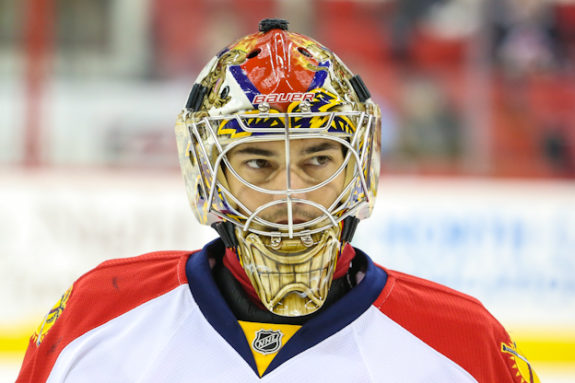
On the other hand, Roy, who tied Théodore in the Vezina Trophy results, actually outdid him by a good margin in categories outside of SV%. But Théodore presumably topped Roy in the Vezina (by the slimmest of margins) and Hart Trophy votes because he backstopped a Canadiens team that was inferior to Roy’s proven Avalanche team. That type of logic, however, seemingly didn’t apply to a Théodore-Iginla comparison, because the playoff factor bolstered Théodore’s case and neutralized Iginla’s in the eyes of some voters.
Related: Where Are They Now? Jonathan Cheechoo Edition
Théodore appeared on 58 of the 62 Hart Trophy ballots, so, in his case, more than one voter wasn’t sold on his performance – or perhaps on the right for a goaltender to win the trophy, which is another debate in itself. Still, he didn’t even end up in the top three in the players’ vote, whereas it seems more writers valued the “standing on his head” for the team’s playoff push storyline.
Iginla’s Career Year Deserved the Hart Trophy
Théodore is the reason the Canadiens made the playoffs in 2001-02. But had they missed the playoffs, which they very nearly did, he’s likely not in the Hart Trophy conversation at all. The Canadiens’ playoff berth notwithstanding, Iginla absolutely should have won the trophy. He was the best and most valuable player throughout the 2001-02 season.
Théodore rode a particularly strong late-season performance to an undeserving Hart Trophy win. The SV% was always there, but he’d won just 22 times in 55 games prior to the season’s final few weeks. His team also squeezed into a weaker Eastern Conference playoff race with just 87 points, whereas it took 94 to make it in the Western Conference. Their run soon extended into a dramatic upset of the Bruins in round one of the playoffs. The post-season press in the eastern Canadian hockey hub of Montreal no doubt aided his cause.
The last-minute nature of the Canadiens’ playoff berth – combined with one completely disgraceful ballot and a few other questionable ones – unfairly robbed Iginla of the win. Today, his 2001-02 season communicates nothing other than a Hart Trophy-worthy performance on a poor team at the height of the dead puck era. Just two years later, he’d lead the Flames on an improbable run to a Game 7 loss in the Stanley Cup Final.
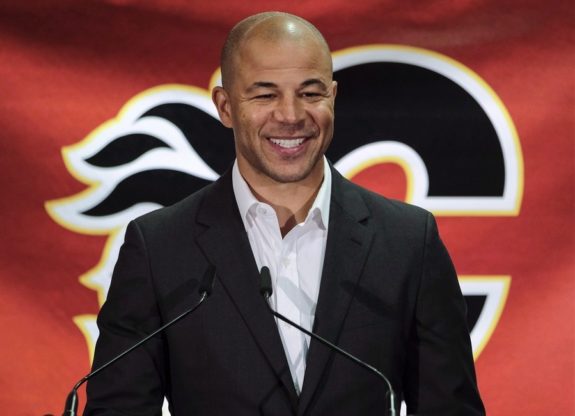
But Iginla’s legacy is not marred by his lack of a Hart Memorial Trophy win. The sure-fire Hall of Famer finished his career with round numbers of 625 goals, 675 assists, and 1300 points. He’s one of the sport’s most respected figures and all-time great leaders. We all remember the run of 30-goal seasons, “The Assist” at the 2010 Olympics and “The Shift” in the 2004 Stanley Cup Final—another setting the Flames would never have reached without their most valuable player.
Lucas Anderson lives in Calgary, AB, and covers the Calgary Flames for THW. He is a graduate of the University of Toronto, where he completed his Master’s in Cinema Studies. Lucas writes on topics including sports, film, visual culture, and history. He still thinks about the Atlanta Thrashers, his former favourite NHL team.
